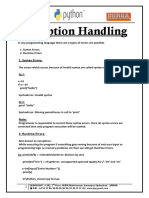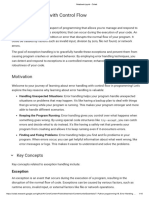Exception_Handling_Python
Uploaded by
Chandu AlaganiException_Handling_Python
Uploaded by
Chandu AlaganiException Handling in Python
Exception handling in Python is a way to handle errors or exceptions that occur during program
execution, preventing the program from crashing. It allows developers to handle unexpected
situations gracefully using try, except, else, and finally blocks.
Basic Syntax of Exception Handling:
try:
num = int(input("Enter a number: "))
result = 10 / num
print("Result:", result)
except ZeroDivisionError:
print("Error: Cannot divide by zero!")
except ValueError:
print("Error: Invalid input! Please enter a number.")
except Exception as e:
print("An unexpected error occurred:", e)
else:
print("No errors occurred.")
finally:
print("Execution completed.")
Handling ZeroDivisionError
try:
x = 10 / 0
except ZeroDivisionError:
print("You cannot divide by zero!")
Handling ValueError
try:
num = int(input("Enter a number: "))
except ValueError:
print("Invalid input! Please enter an integer.")
Handling Multiple Exceptions
try:
num1 = int(input("Enter a number: "))
num2 = int(input("Enter another number: "))
result = num1 / num2
except (ValueError, ZeroDivisionError) as e:
print("Error:", e)
Using finally Block
try:
file = open("sample.txt", "r")
content = file.read()
except FileNotFoundError:
print("File not found!")
finally:
print("Closing the file (if opened).")
Why Use Exception Handling?
1. Prevents program crashes due to runtime errors.
2. Improves user experience by providing meaningful error messages.
3. Ensures important cleanup actions (e.g., closing files, releasing resources).
4. Makes debugging easier by identifying specific errors.
You might also like
- Comprehensive_Exception_Handling_Notes_Class12No ratings yetComprehensive_Exception_Handling_Notes_Class124 pages
- CLASS XII COMPUTER SCIENCE NOTES CHAPTER 1 Chapter 1 Exception Handling in PythonNo ratings yetCLASS XII COMPUTER SCIENCE NOTES CHAPTER 1 Chapter 1 Exception Handling in Python4 pages
- Unit4 ExceptionalHandlingpdf 2023 08 01 11 38 08No ratings yetUnit4 ExceptionalHandlingpdf 2023 08 01 11 38 0824 pages
- Cream Purple Abstract Thesis Defense PresentationNo ratings yetCream Purple Abstract Thesis Defense Presentation16 pages
- Unit v 2.Exception Handling in Python(NEP)No ratings yetUnit v 2.Exception Handling in Python(NEP)28 pages
- Unit-II Exception Handling and MultithreadingNo ratings yetUnit-II Exception Handling and Multithreading123 pages
- Introduction To Exception Handling in Python Class 12 Computer Science100% (3)Introduction To Exception Handling in Python Class 12 Computer Science16 pages
- COMPUTER LEARNING PACK GRADE XII 1-6 april.docxNo ratings yetCOMPUTER LEARNING PACK GRADE XII 1-6 april.docx4 pages
- 13539_253_125_Python_Exception_Handling_M3No ratings yet13539_253_125_Python_Exception_Handling_M36 pages
- CMPE-30032-Module-3-Exception-Handling-in-Python-1No ratings yetCMPE-30032-Module-3-Exception-Handling-in-Python-121 pages
- Exception Handling_Python[1] [Read-Only]No ratings yetException Handling_Python[1] [Read-Only]18 pages



























































